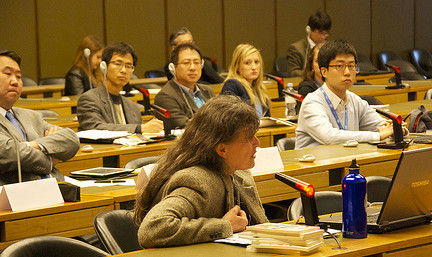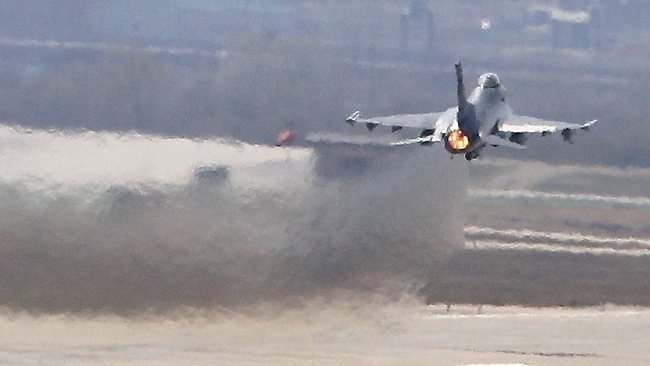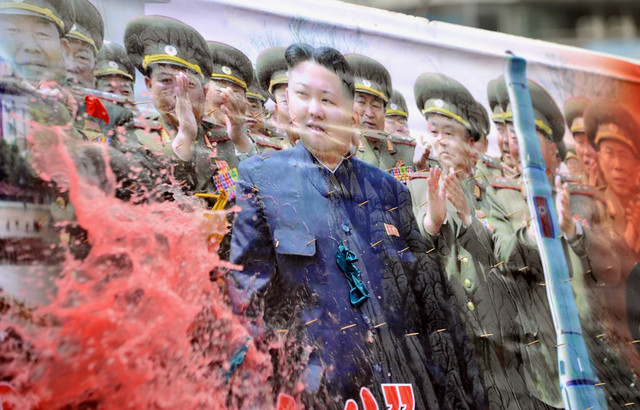Interviews, commentary and analysis given by staff and associates of the Nautilus Institute.
Implementation of a NEA-NWFZ in China and North Korea, Peter Hayes, NPT Preparatory Committee NGO Workshop, 25 April 2013

Peter Hayes discusses the Implementation of a NEA-NWFZ in China and North Korea at The Future of the Peace Process and Prospects for a Nuclear Weapon Free Zone in Northeast Asia NPT Preparatory Committee NGO Workshop organized on the 60th anniversary of the Armistice agreement.
Go to the articleChina no tiene la influencia ni el interés para resolver la crisis con Corea del Norte, Jose Reinoso, EL PAÍS,

Peter Hayes es cofundador y director de Nautilus Institute for Security and Sustainability, un grupo de pensamiento no gubernamental, con sede en Berkeley (California), especializado en Asia, en particular, en Corea del Norte. También es profesor de Relaciones internacionales en el Instituto Real de Tecnología de Melbourne (Australia), la ciudad en la que nació. Hayes pasa revista en una entrevista por correo electrónico a la situación de la crisis en la península coreana, y prevé que “para junio, las aguas estarán relativamente tranquilas y se reanudará algún tipo de diálogo” entre Washington y Pyongyang. Hayes tiene doble nacionalidad, australiana y estadounidense.
Go to the articleThe Korean Crisis in Perspective With Dr. Peter Hayes of the Nautilus Institute, Host Travis Coffman, Fox 6 News Guam, Pacific News Center

Guam – Dr. Peter Hayes was a guest on the Big Show with Travis Coffman Friday. He spoke with Big Show Host Travis Coffman about the current crisis providing insight into what the North’s recent bellicose rhetoric actually means.
Go to the articleNorth Korea’s fury at US-South Korea war games goes back decades, News.com.au

A quieter US approach to the joint military drills would have sent the deterrence message Washington wanted “to warn the North Koreans to not walk too close to the edge of chaos. Instead, in the desire to impress the ally (South Korea) that we had their back covered, we decided to escalate the threat symbolism” with the B-2 and B-52 bomber flights, said Peter Hayes, who heads the Nautilus Institute, an Asia-focused think tank.
Go to the articleWorld Affairs Programme, BBC Radio 5live, 8 April 2013
Peter Hayes discusses the recent postponement of the US Minuteman test in light of escalating tensions with North Korea. Interview aired on the BBC Radio 5live World News Programme on April 8th, 2013. Click here to listen to the full program.
Go to the articleRapid Fire April 5, 2013: Nuclear Options, from Britain to North Korea, Defense Industry Daily, 5 April 2013
Peter Hayes and Roger Cavazos at the Nautilus Institute think North Korea can and should be engaged as a rational actor, if only to clarify their intentions. It might turn out to be wishful thinking, but they have a point: just because all parties don’t want to escalate tensions into a war, doesn’t mean events won’t spiral out of control, especially as backing off is hardly a viable option from the American perspective.
Go to the articleNorth Korea’s threat against key symbol of cooperation, Sen Lam, ABC Radio Australia, 4 April 2013
The Kaesong industrial park was one of a number of North-South cooperation projects started by the late President Kim Dae-Jung and his North Korean counterpart, Kim Jong-Il in 2004. The latest threat comes as the United States says it will send a missile defence system to the Pacific island of Guam, as a precaution against […]
Go to the articleNorth Korean War Threats Spotlight Its Untested Dictator, Terry Atlas, Bloomberg, 1 April 2013

The situation is “more dangerous than it has been at any time since 1976,” when the U.S. and North Korea nearly came to blows under Kim’s grandfather, said Peter Hayes, executive director of the Nautilus Institute, a research group in Berkeley, California.The situation is “more dangerous than it has been at any time since 1976,” when the U.S. and North Korea nearly came to blows under Kim’s grandfather, said Peter Hayes, executive director of the Nautilus Institute, a research group in Berkeley, California.
Go to the articleNorth Korea tensions near boiling point, Japan Times, 31 March 2013

Soaring tensions on the Korean Peninsula have seen dire North Korean threats met with an unusually assertive U.S. response that analysts warn could take a familiar game into dangerous territory…
Peter Hayes, who heads the Nautilus Institute, an Asia-focused think tank, points out that the B-52 deployment carried a particular — and potentially dangerous — resonance.
After a bloody border incident in 1976 left two American soldiers dead, the United States spent weeks sending flights of B-52 bombers up the Korean Peninsula, veering off just before they entered the North’s airspace. Then-U.S. Secretary of State Henry Kissinger commented that he had “never seen the North Koreans so scared.”
Hayes warned that replaying the B-52 threat could prove to be “strategically stupid” by reviving the North’s historic and deep-rooted fear of a U.S. nuclear strike. “The B-52 deployment also declares loudly and clearly that they have forced the U.S. to play the game of nuclear war with North Korea,” Hayes said. “It tells them it has reached the hallowed status of a nuclear-armed state that matters enough to force a simulated nuclear-military response.”
Go to the articleNorth Korea’s threats: Five things to know, Matt Smith, CNN, 24 March 2013
“Peter Hayes, director of the San Francisco-based Nautilus Institute, says there’s also a debate going on inside the North Korean leadership about the country’s future as a nuclear state. One side wants “to be a nuclear-armed state that is able to behave like the recognized, legal nuclear weapons states and play their game and turn the tables on them,” Hayes said. “That is, in my view, what is going on in the test and the rocket firing,” he said. “The other policy current is associated with the Ministry of Foreign Affairs and the international faction of the Korean Worker’s Party, which is to negotiate our way out of this mess.”
Go to the article
